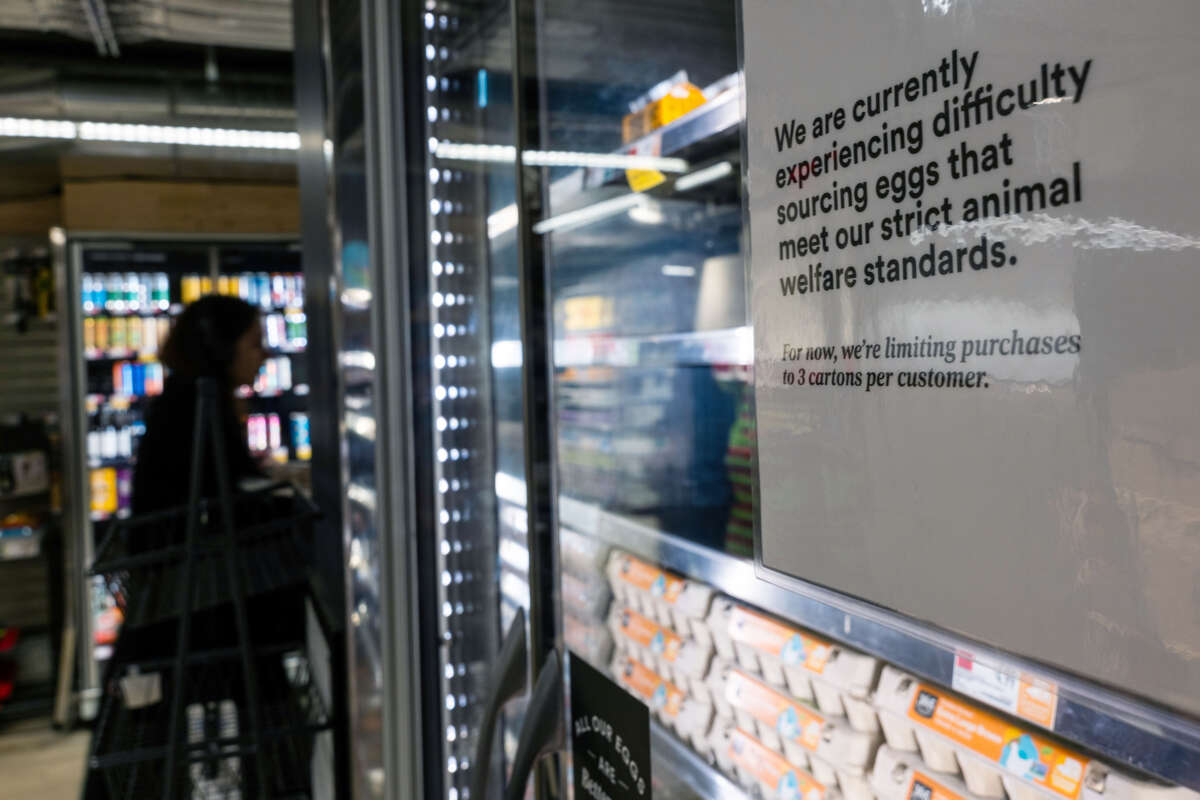Multiple national grocery retailers are imposing limits on how many cartons of eggs consumers can purchase amid a shortage of the product and rising grocery prices across the U.S.
As of Monday morning, the average price for a dozen eggs was around $7.74 — an increase of about 18 percent since President Donald Trump took office. According to a report from NBC News, many national chains, including Trader Joe’s, Walmart, Costco, and others, have started restricting how many eggs each shopper can buy in a single visit.
Other grocery store costs have also gone up. The cost of wheat has increased by about 11.8 percent since Trump was inaugurated, while the cost of cheese has gone up 1.59 percent.
Many have used the “price of eggs” analogy to define Trump’s focus on consumer prices (or lack thereof) since he started his second term in office, due to his multiple promises during the 2024 presidential campaign to tackle rising costs. Since becoming president again, however, his focus has been on other issues, barely taking any action to address prices at all.
In August, Trump pledged that “prices will come down” if he became president again, and “come down fast.” In September, he made a similar promise: “Groceries, cars, everything. We’re going to get the prices down,” Trump said.
But in December, after he won the election, Trump changed his tune entirely, reneging on the promises he made and de-emphasising controlling rising costs as a priority for him.
“It’s hard to bring things down once [prices go] up. You know, it’s very hard,” Trump said in a post-election interview.
Just this past week, Trump also denied that he could do anything about rising grocery prices, specifically on eggs, blaming the previous administration and the presence of bird flu in the U.S. for growing costs.
Prices were at an “all-time high” before he became president, Trump said over the weekend. “This was caused by Biden,” Trump added, stating he had “four years of virtually no inflation” during his first term.
Those comments from Trump are false or highly misleading — egg prices reached “all-time high” status after he took office. Biden also didn’t cause the price hike, but the bird flu did play a huge role in it, as farmers across the country have had to slaughter millions of hens who have either had the virus or were likely infected with it.
Trump was likely aware that bird flu was going around during the campaign, as reports about it were appearing in the fall, but it didn’t stop him from making promises to lower prices in spite of it. In other words, his promise to lower grocery store costs invites greater scrutiny as he (or at least his campaign) was likely aware of the situation relating to bird flu unfolding.
Trump has only seemingly taken one direct executive action to address consumer costs, issuing an order on his first day in office. However, that order is very ambiguous, and merely tells the heads of executive departments to pursue actions that could possibly lower costs — examining possible deregulations that likely won’t have enormous cost savings, for example. There are no deadlines within that order to take such actions and the only requirement is for progress reports to be given to Trump every 30 days.
Instead, Trump has issued myriad executive orders focusing on topics most Americans disagree with him on and are focused on restricting the human rights of marginalized communities — such as, orders attacking transgender people in the U.S., attempting to re-write the birthright citizenship standard within the 14th Amendment of the Constitution, and renaming the Gulf of Mexico in government documents to be the “Gulf of America” — but none which address the issue of tackling rising consumer prices.
Trump’s proposed and imposed tariffs on other countries’ products being imported to the U.S. will also have detrimental consequences on costs, most economists agree. Again, Trump campaigned that the tariffs would not hurt consumers — however, he has also since walked back that promise, admitting earlier this month that shoppers will experience “pain” because of them.
“We never want to raise prices. Our model is everyday low prices. But there probably will be cases where prices will go up for consumers,” Walmart CFO David Rainey said last fall, responding to Trump’s tariffs plan.
Media that fights fascism
Truthout is funded almost entirely by readers — that’s why we can speak truth to power and cut against the mainstream narrative. But independent journalists at Truthout face mounting political repression under Trump.
We rely on your support to survive McCarthyist censorship. Please make a tax-deductible one-time or monthly donation.
